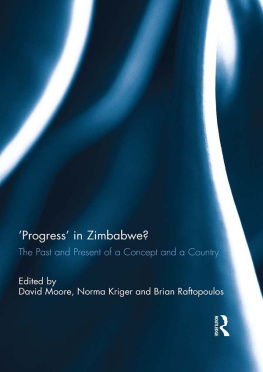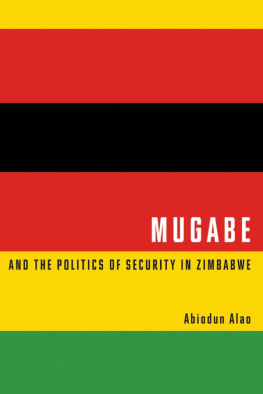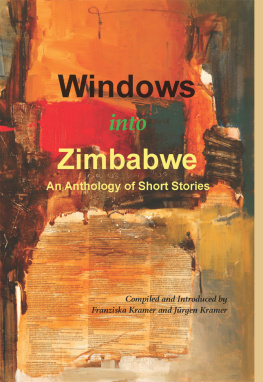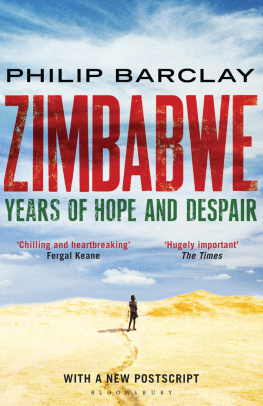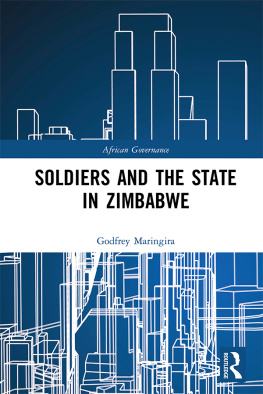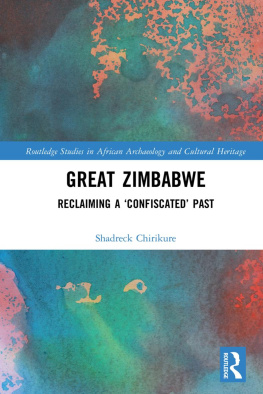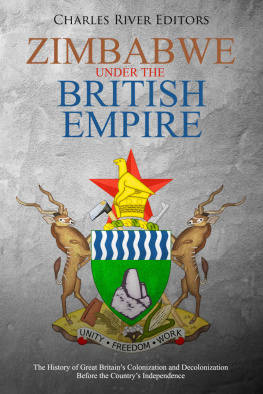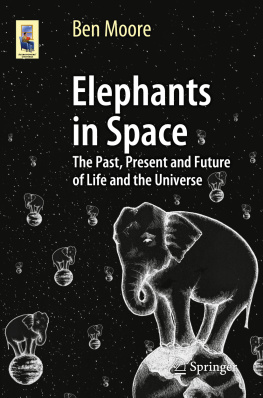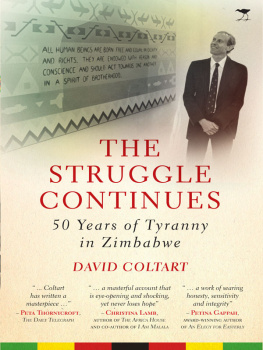Progress in Zimbabwe?
In this edited collection, scholars from Zimbabwe and abroad contribute essays that deepen our understanding of the causes, dynamics and consequences of Zimbabwe's current crisis. The volume includes considerations of the dynamics of accumulation and power in Zimbabwe, historiographical perspectives, civil society and state relations, workers' and peasants' responses to Zimbabwe's crisis, and debates on foreign investment, land reform and the relevance of the concept of the National Democratic Revolution to Zimbabwe and South Africa's relations with it. The theme of progress a concept underpinning modern, liberal and radical perspectives of development unifies these disparate issues. The book engages in debates about how the idea of progress informs present and past analyses of Zimbabwe.
This book was published as a special issue of the Journal of Contemporary African Studies.
David Moore is Professor of Development Studies at the University of Johannesburg.
Norma Kriger is a Researcher in the Federal Research Division of the Library of Congress in Washington D.C. and a Research Associate at the University of Johannesburg.
Brian Raftopoulos is Director of Research and Advocacy for the Solidarity Peace Trust, and Mellon Senior Research Mentor, Centre for Humanities Research at the University of the Western Cape.
Progress in Zimbabwe?
The Past and Present of a Concept and a Country
Edited by
David Moore, Norma Kriger and Brian Raftopoulos
First published 2013
by Routledge
2 Park Square, Milton Park, Abingdon, Oxon, OX14 4RN
Simultaneously published in the USA and Canada
by Routledge
711 Third Avenue, New York, NY 10017
Routledge is an imprint of the Taylor & Francis Group, an informa business
2013 The Institute of Social and Economic Research
This book is a reproduction of the Journal of Contemporary African Studies, vol. 30, issue 1. The Publisher requests to those authors who may be citing this book to state, also, the bibliographical details of the special issue on which the book was based.
All rights reserved. No part of this book may be reprinted or reproduced or utilised in any form or by any electronic, mechanical, or other means, now known or hereafter invented, including photocopying and recording, or in any information storage or retrieval system, without permission in writing from the publishers.
Trademark notice: Product or corporate names may be trademarks or registered trademarks, and are used only for identification and explanation without intent to infringe.
British Library Cataloguing in Publication Data
A catalogue record for this book is available from the British Library
ISBN13: 978-0-415-59465-3
Typeset in Times New Roman
by Taylor & Francis Books
Publisher's Note
The publisher would like to make readers aware that the chapters in this book are referred to as articles as they had been in the special issue. The publisher accepts responsibility for any inconsistencies that may have arisen in the course of preparing this volume for print.
Contents
| David Moore |
| Norma Kriger |
| Ian Phimister |
| Kirk Helliker |
| Martin Dawson and Tim Kelsall |
| Booker Magure |
| Tapiwa Chagonda |
| Vusilizwe Thebe |
| David Moore |
| John Hoffman |
| Blair Rutherford |
The chapters in this book were originally published in the Journal of Contemporary African Studies, volume 30, issue 1 (January 2012). When citing this material, please use the original page numbering for each article, as follows:
Chapter 1
Progress, power, and violent accumulation in Zimbabwe
David Moore
Journal of Contemporary African Studies, volume 30, issue 1 (January 2012)
pp. 110
Chapter 2
ZANU PF politics under Zimbabwe' Power-Sharing Government
Norma Kriger
Journal of Contemporary African Studies, volume 30, issue 1 (January 2012)
pp. 1126
Chapter 3
Narratives of progress: Zimbabwean historiography and the end of history
Ian Phimister
Journal of Contemporary African Studies, volume 30, issue 1 (January 2012)
pp. 2734
Chapter 4
Civil society and state-centred struggles
Kirk Helliker
Journal of Contemporary African Studies, volume 30, issue 1 (January 2012)
pp. 3548
Chapter 5
Anti-developmental patrimonialism in Zimbabwe
Martin Dawson and Tim Kelsall
Journal of Contemporary African Studies, volume 30, issue 1 (January 2012)
pp. 4966
Chapter 6
Foreign investment, black economic empowerment and militarised patronage politics in Zimbabwe
Booker Magure
Journal of Contemporary African Studies, volume 30, issue 1 (January 2012)
pp. 6782
Chapter 7
Teachers' and bank workers' responses to Zimbabwe' crisis: uneven effects, different strategies
Tapiwa Chagonda
Journal of Contemporary African Studies, volume 30, issue 1 (January 2012)
pp. 8398
Chapter 8
New realities and tenure reforms: land-use in worker-peasant communities of southwestern Zimbabwe (1940s2006)
Vusilizwe Thebe
Journal of Contemporary African Studies, volume 30, issue 1 (January 2012)
pp. 99118
Chapter 9
Two perspectives on Zimbabwe' National Democratic Revolution: Thabo Mbeki and Wilfred Mhanda
David Moore
Journal of Contemporary African Studies, volume 30, issue 1 (January 2012)
pp. 119138
Chapter 10
Reflections on the concept of progress and Zimbabwe
John Hoffman
Journal of Contemporary African Studies, volume 30, issue 1 (January 2012)
pp. 139146
Chapter 11
Shifting the debate on land reform, poverty and inequality in Zimbabwe, an engagement with Zimbabwe' Land Reform: Myths and Realities
Blair Rutherford
Journal of Contemporary African Studies, volume 30, issue 1 (January 2012)
pp. 147157
David Moore
Department of Anthropology and Development Studies, University of Johannesburg, South Africa
Zimbabwe's recent travails have challenged the concept of progress as it is popularly conceived, as they have forced social scientists to revisit many of the verities of nationalist history and the initial euphoria of Zimbabwean liberation. Critics of fast-track land reform and patriotism, however, have been as simplistic as the regime's academic praise singers, and often simply turn celebratory scholarship upside down. Historically rooted and specifically applied concepts of primitive accumulation can assist the understanding of the development of Zimbabwe's coercive networks of accumulation and their more recent manifestations, but they do not solve the problems of how to lessen violence and deepen democracy in the short term.
As Roger Southall raised the idea for this special edition of the Journal of Contemporary African Studies many years ago, the popular political theorist John Gray's gloomy reflections on the idea of progress seemed to be very relevant to Zimbabwe. Gray's

